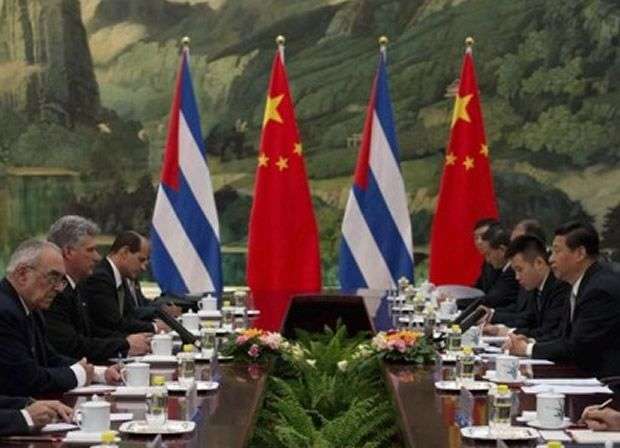The First Vice President of the Councils of State and Ministers and member of the Political Bureau of the Central Committee of the Communist Party of Cuba, Miguel Diaz-Canel Bermúdez, paid official visits to China, Vietnam and Laos, where the respective bilateral economic issues occupied much of the agenda. In China, Diaz Canel attended with his host, Vice President Li Yuanchao, the signing of three agreements: a donation, another interest-free credit and the last credit agreement for the purchase of machinery and equipment for Cuban agriculture. Chinese President Xi Jinping, and Premier Li Keqiang also received the Cuban Vice President.
During the stay in China the Cuban leader visited the company BIOTECH Pharmaceutical Co. LTD (BPL), the first joint project in the field of biotechnology, with 10 years of existence, and especially dedicated to the production of monoclonal antibody Nimotuzumab (treatment of cancer), developed by Cuba. A new plant in another joint venture (ChangHeber) was inaugurated during this official visit in Changchun, dedicated to the production of Hib vaccine against Haemophilus influenzae.
● ● ● ● ● ● ● ●● ● ● ●
By the end of May 429 458 Cubans held self-employed licenses, which is an increase of about 30 000 in five months compared to the end of 2012, according to data provided by the Ministry of Labour and Social Security (MTSS ). Most of these people (68 percent) had no employment, only 18 percent were workers and 14 percent retirees. Most of the self-employed are in the provinces of Havana, Matanzas, Villa Clara, Camaguey, Holguin and Santiago de Cuba. Among them account for 64 percent of those registered. Most of the licenses being requested is for “hired workers” (18 percent), which in practice is the legal mode way to hire labor for private businesses.
In order of prevalence licenses are intended for processing and sale of food, freight and passenger transportation, housing rental, vendors or seller of agricultural products and producer-seller of home utensils. These data demonstrate all initial trends are still on from the expansion of these forms of work and employment in 2010.
The authorities hoped by now to have about 500 000 self-employed people and recognized this trend slowed down last year, and migration from state employment to self-employed activities is limited. The desire to change the country’s employment structure, predominantly with the state, is still an unsolved plan. Months ago the current president of the National Assembly said that in five years, as required by the Cuban government, between 40 and 45 percent of the GDP of the island will be provided by non-state forms of production.
● ● ● ● ● ● ● ●● ● ● ●
Reuters news agency reports that Canadian businessman Sarkis Yacoubian, originally from Armenia and owner of the import company Tri-Star Caribbean, and his cousin and partner, Krikor Bayassalian, Lebanese citizen, were convicted of bribery and other charges in a trial led by a Cuban court. Yacoubian, who presented evidence to the government after his arrest after closing his company, was sentenced to nine years in prison. Bayassalian was sentenced to four years in prison. Meanwhile, Amado Fakhle and Stephen Purvis, senior executives of British investment company Coral Capital Group Ltd, were convicted of lesser charges and released for time served after being arrested. Not yet announced the date of another pending trial, this time against the owner of another Canadian trading company, Cy Tokmakjian, who was arrested in September 2011.
“Arrests of foreign businessmen, Reuters says, as part of a wider campaign to end government corruption, have sent strong signals to the business community in Cuba, where foreign trade is one of the most visible. Until then, foreign businessmen suspected of corruption almost always used to be deported instead of being imprisoned on the island. ”
● ● ● ● ● ● ● ●● ● ● ●
One of the most beautiful Cuban roads, the one that runs along 182 kilometers of south eastern Cuban coastline, from Santiago de Cuba to Manzanillo, Granma, will be fully repaired in the coming months. This is the main means of communication for these territories nestled in the Sierra Maestra, whose economy is based on coffee and other agricultural items. The proximity of the sea, the numerous bridges over the 32 rivers flowing through to the sea just in the Santiago municipality of Guama, makes of this a highly complex constructive work. The capital repair of the Granma road will be implemented in three stages: Santiago de Cuba-Chivirico, (with 73 kilometers planned), Chivirico-The Macío (74), and The Macío-Pilon (35).










